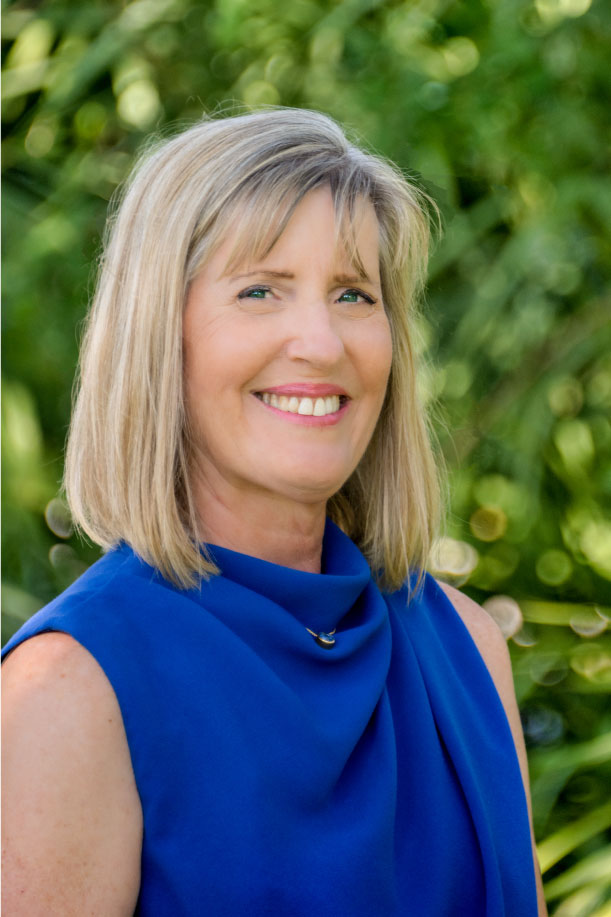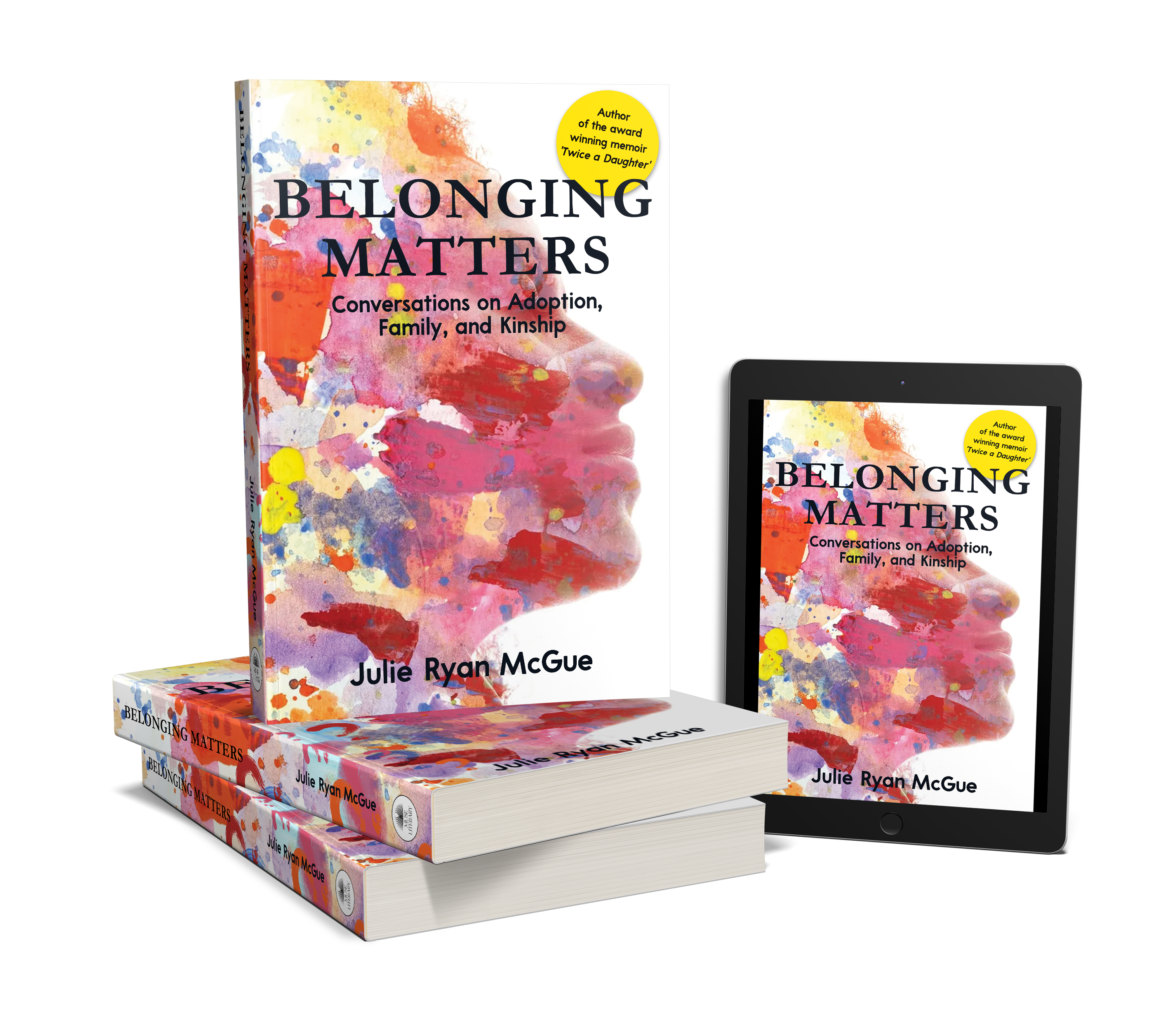November Is Full
… of so many important things besides the election!

Julie McGue
Author
November is one of my favorite months mostly because of the weather and my favorite holiday: Thanksgiving.
I love the clear and cool days, fixing warm drinks like ginger-peach tea and maccha lattes, and witnessing the trees showing off their exuberant color while simultaneously emptying their branches. (If you missed my award-winning essay about our Indiana family tree farm, read it here.) As a kid, my five siblings and I loved raking the yard, piling up the leaves in huge, crumbly but cushy mounds into which we’d pounce and play for hours–no trampoline needed! (Maple grove pictured is at my Indiana home.)

The other reason I’m Super Pumped for November is twofold.

My second book, Belonging Matters: Conversations About Adoption, Family & Kinship turns one-year-old on November 1st. Isn’t that a gorgeous, compelling cover? I love the question marks sprinkled above and beyond the embedded image of a multi-colored face. The book’s collection of essays supports the adoption community while creating a conversation with those not directly touched by adoption, and it includes many true and personal family stories.
The book’s November release coincided with an important event:
National Adoption Awareness Month (NAAM)
National Adoption Awareness Month is a time set aside to acknowledge the many lives touched by adoption. Adoption Awareness Month was designated to spread awareness, celebrate families grown through adoption, and recognize the many foster care children still waiting for homes.
All this brings up an important question asked by those within and outside the adoption constellation:
How do adoptive parents talk about adoption with their adopted child?
First a little history and then a personal anecdote, one that appears in my forthcoming memoir, Twice the Family.
In the closed adoption era, a child’s adoption was often a closely guarded secret and rarely discussed. Because of infertility issues, adoption was the only vehicle for adoptive parents to build a family. Which meant adoption was a gift, but it was also a stigma for them. Also, at this time in our country’s history— a time when abortion was not an option— societal shame forced an unwed woman who was “in the family way” into placing her child for adoption.
Thus, the stigma of illegitimacy trickled down to the adoptee. As a result, adoption agencies matched adoptees to their adoptive families, so they looked like they fit in. This practice enabled adoptive parents and their child to avoid public scrutiny and avoid uncomfortable conversations about infertility and illegitimacy.
Nowadays, in modern adoptions, adoptive parents readily discuss the details of their child’s adoption story with them. These open adoptions provide an exchange of important information like family background and medical history between the birth and adoptive families. Sometimes the adoption plan allows for frequent contact between all parties. Secrecy and stigma are less likely to be factors in the relationship between the members of adoption’s triad.
Because I am a product of the closed adoption era, my adoption and the circumstances surrounding it were not a frequent conversation. The rigors of closed adoption meant there was little information our adoptive parents could pass on. If my adoptive parents brought up adoption at all, the dialogue was associated with a special occasion like my birthday.
Here’s a condensed excerpt from a chapter in my next book which highlights how my parents spoke to my twin sister and me about our adoption:
“Come in girls!” Dad’s expression was serious and thoughtful.
He gestured to the cream damask sofa with its perfectly place velvet pillows. Jenny took the end with the rust-colored pillows, so I plopped down in the middle near her. When Mom appeared in the doorway, she gave my dad a quick nod. He leaned over the coffee table, stubbing out his cigarette in the ashtray. Mom untied her apron and took a seat in the matching armchair across from my dad.
Mom nodded at my father. “Please begin, dear.”
I scooted in tight to my sister. Our thighs nearly touched. Being close to her made the flip flopping in my belly settle down.
“Your mother and I wanted to have a little talk with you. It seems fitting since it’s your birthday. Remember our other talks about the two of you being adopted?”
My sister and I glanced at one another and then back at our parents. Out of the corner of my eye, I saw my sister nod, so I did the same. I swallowed, wishing I could dart into the dining room and finish the glass of milk I’d left on the table.
Why did our special day have to end like this?
“You know we love you both very much, right?” Dad said.
We nodded again.
“That we desperately wanted you to be our girls? We love you very much.”
“We love you too,” I said, picking at the cording on the edge of the cream sofa.
Dad’s smile vanished. He glanced at Mom and continued. “If someday you decide you want to look into your adoption. We’ll help you.”
Suddenly, it felt as if there was no more air in the room. I wanted to roll my eyes at my twin, poke her, and run back up to our room. I didn’t dare. Instead, I just sat there, gaping, speechless.
Thank God my sister answered for both of us.
“We’re happy. We don’t need to look into the adoption stuff.”
My sister’s little speech brought instant smiles to my parents’ faces. I felt relief wash over me. I liked making my parents happy.
The look Dad gave Mom seemed to say, “I told you so.”
My twin’s words pleased me, too. She’d spoken for both of us. I hoped we were done with this icky conversation once and for all.
Dad blew us each a kiss and picked up his Scotch. “Okay, that’s all we wanted to talk about.”
Each time my parents called my sister and me into the living room for these “adoption talks” we grew more comfortable discussing it; it became part of our family’s story. I’m relieved that our adoption wasn’t a secret, that our parents expressed how they felt about us, and that they offered to help us learn more about our adoption story if we wanted. Over time, an uncomfortable topic became normalized, but it would take a lifetime before I took my parents up on their offer.
Follow Me Here
In November (14-17th), Julie will attend Story Studio’s four day writing retreat with instructors Rebecca Makkai and Vu Tran at the Guesthouse Hotel in Chicago’s Andersonville neighborhood. The theme for the retreat is “5,000-Word Weekend.”
On November 20th, Julie will be Dawn Davenport’s guest on the Creating a Family podcast when they will discuss Julie’s adoption story and her books.
On December 5th, Julie will return to the Social Work Bubble podcast with Laura Swanson. They will discuss Julie’s forthcoming memoir, Twice the Family.
In December (10-13th), Julie will be a featured speaker and panelist at Shattering Stigmas: A Summit on Redefining Mental Health Narratives, co-hosted by Tammy Vincent and Jessica Kazaniwskyj. The summit’s goals include redefining mental health narratives, breaking barriers, and creating lasting change. Julie will discuss the some of the childhood traumas presented in her next book, Twice the Family.
On December 19th, Julie will be a return guest for Adult Child of Dysfunction podcast with host Tammy Vincent to discuss the childhood traumas revealed in Julie’s next book, Twice the Family. When the recording airs, the link will post here.
On February 4, 2025, Julie’s new memoir, Twice the Family: A Memoir of Love, Loss, and Sisterhood hits the bookshelves. It’s the long-awaited prequel to her award-winning debut, Twice a Daughter.
On February 13, 2025, Julie will be a return guest to Thriving Adoptees podcast with host Simon Benn. They will discuss Julie’s forthcoming memoir, Twice the Family.
Follow Julie by visiting her website, subscribe to her bimonthly newsletters, and listen to previous podcast recordings where she discusses topics like adoption, identity, and belonging.
“Each time my parents called my sister and me into the living room for these “adoption talks” we grew more comfortable discussing it; it became part of our family’s story.”
Don’t miss a blog post!
Receive my blog posts directly to your inbox.

